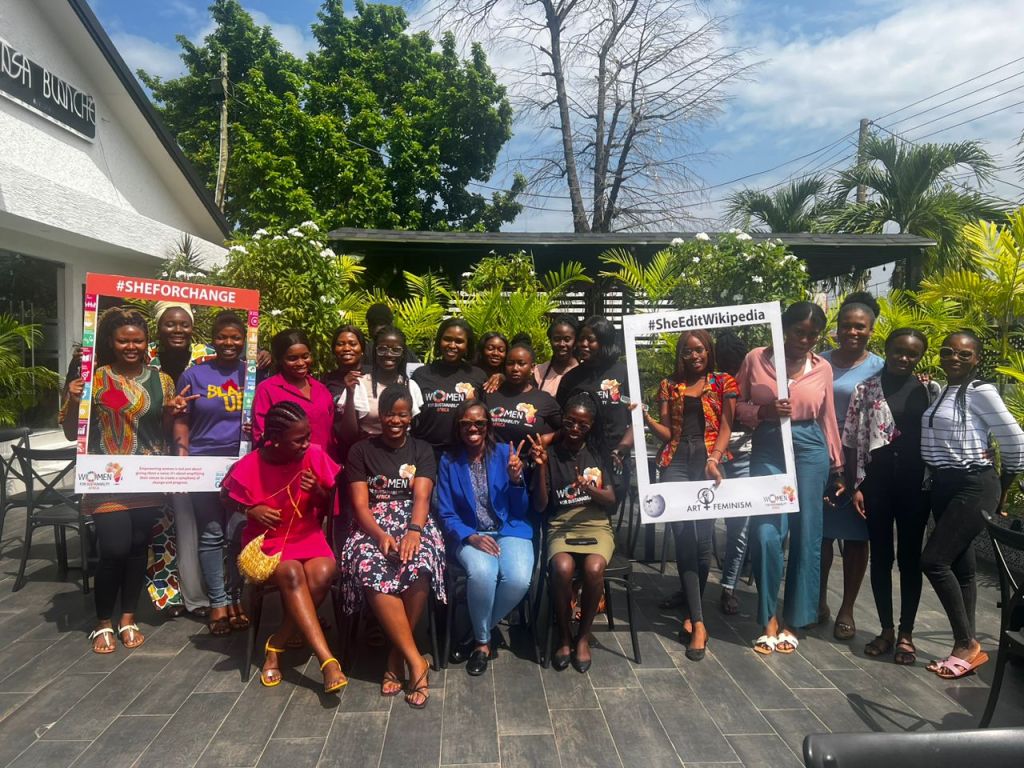
Imagine a world where women’s voices shape the stories we tell online. A world where African perspectives paint a richer picture on platforms like Wikipedia. This is the vision that brought Women for Sustainability Africa and Arts + Feminism together in Accra, Ghana.
Anita Ofori
Women For Sustainability Africa, a non-profit organization dedicated to promoting Women Empowerment and Environmental Sustainability, collaborated with Arts + Feminism to host its inaugural Arts + Feminism Event. Thanks to Sadik Shahadu who introduced us and whose support together with Zita Zage regional coordinators for Arts+Feminism guided and supported us to host our first event.
The event was held in Cafe Bar Noir in Accra, Ghana, and drew a diverse group of people who care about sustainability, gender equality, and arts. With 28 attendees, including 25 women, the event provided a significant platform for empowerment and knowledge-sharing.
A highlight of the event was a presentation by guest trainer Ruby D-Brown, who introduced participants to Arts Feminism and the gender gap on Wikipedia. She also demonstrated how Wikipedia and Wikidata can be great tools for knowledge dissemination, changing narratives, and addressing biases about women’s issues. Participants learned new skills such as creating Wikidata items about women and improving existing articles about women on Wikipedia.
Our second guest, Max Beganin, an Open Knowledge enthusiast and Climate activist, presented on how women are affected by climate change and how we can address such knowledge gaps on platforms like Wikipedia.
Executive Director and Co-Founder of Women for Sustainability Africa, Anita Ofori emphasized the urgent need to address the gender gap on Wikimedia projects and called for greater collaboration to ensure maximum participation and support for women in the movement. She also encourage participant to put to work what they have learned and leverage on the existing support that will be provided from time to time.
Participants exchanged ideas and shared their views around the topic and meaningful connections among attendees, united by their commitment to sustainability, gender equality, and the arts. The event was followed by two virtual practical training sessions on editing Wikipedia.
Here was some of the feedback by participants.
I am excited that by myself I have been able to add a few women on Wikidata during the practical session..- Queen
I have had the opportunity to be at this event to meet other women trying to bridge the gap around sustainability. I had the opportunity to see how Wikidata can help us bridge the knowledge gap by contributing to information around gender and sustainability. We also had the opportunity to learn about Arts + Feminism and how they are committed to bridging the gender gap- Grace
I learnt about Wikipedia and Wikidata and sustainability. With Wikimedia I learnt how to create an article on wikidata. I think we should include women in everything we do. It shouldn’t be one-sided because women are also part of the society. I am currently working on an article on Wikidata- Ama
I have learnt that Art + Feminism is seeking to bridge the gender gap by promoting gender equality and ensuring a more inclusive Wikimedia community. Now there is not much information on Wikidata talking about women who are contributing to sustainability, climate change and all that. So we want to bridge that gap and make sure we encourage a lot of women to join this project. Thank you. – Vivli
The engagements didn’t end there, all participants were enrolled on our Wikipedia Community WhatsApp group for further engagement. The collaboration between Women for Sustainability and Arts + Feminism created a great platform for women to voice their perspectives and contribute their voices. Together, we can rewrite narratives, bridge gender gaps, and champion women, sustainability, and the arts.
Follow Women for Sustainability Africa on Facebook, Twitter, LinkedIn, TikTok, and YouTube for more updates.
Gallery
All photos can be accessed on Wikimedia Commons.











Can you help us translate this article?
In order for this article to reach as many people as possible we would like your help. Can you translate this article to get the message out?
Start translation